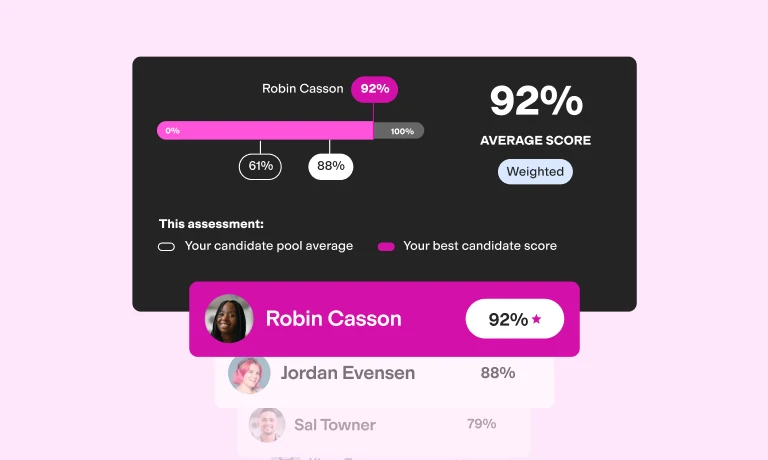Non-compete agreements can seem like a magic bullet to protect your business interests. They can stop employees from taking trade secrets, client lists, and other confidential data out the door when they leave.
Unfortunately, non-compete agreements are quite difficult to navigate. Many courts won’t uphold non-compete agreements unless they’re carefully crafted to be reasonable.
In this article, we highlight where employers go wrong and how to avoid the pitfalls that prevent non-compete agreements from being valid. This way, you can ensure non-compete clause validity.
Non-compete clause validity: What makes a non-compete clause invalid?
Below are six common problems that can make your non-compete clauses invalid. This means they won’t stand up in court.
Problem 1: You don’t have a legitimate interest to protect
What are you trying to protect with your non-compete agreement? If you can’t answer this question easily, your agreement probably won’t stand up to a challenge.
Some employers ask everyone from software developers to administrative assistants to sign off. This is a recipe for failure – your administrative assistant isn’t likely to have access to the type of information your non-compete agreement is designed to protect.
Non-compete agreements can be valid only when they protect a legitimate business interest. A legitimate business interest typically includes trade secrets, confidential information valuable to the business, significant client relationships, or highly specialized training.
Solution
Evaluate whether your employee can truly pose a risk to your interests before offering them a non-compete agreement.
For example, to protect trade secrets, use non-compete agreements only with employees granted access to those trade secrets. Don’t attempt to restrict employees who aren’t in a position to put your interest at risk.
Problem 2: You break the agreement first
Non-compete agreements are often clauses within employment contracts. These contracts place requirements on you and your employees. Failing to meet your requirements under other employment contract terms may make enforcing the non-compete agreement impossible.
For example, the employment contract may have a timeline for final payment of compensation when the employee leaves. Say you process payroll outside that timeline and don’t deliver the payment in line with the contract. In this case, you’ve breached the agreement. This can create an obstacle when you want to enforce the non-compete section of the agreement against the former employee.
Solution
Review employment contracts regularly to ensure compliance, and avoid including promises you may have difficulty meeting. Consider our example above. In that example, setting a timeline for final compensation that doesn’t align with the company’s usual practices might not be the best idea.
Another common pitfall is including contract terms for programs likely to change over time. For instance, say you provide private health insurance to your employees. Avoid contract language that requires employee agreement to change the insurance plan. This way, you can adjust the insurance plan over time without needing your employee to agree with every adjustment.
You should also review a departing employee’s contract to ensure all terms related to their departure can be met in a timely manner. This ensures all parts of their contract – including the non-compete clause – are more enforceable.
Problem 3: Your agreement lasts for too long
To be valid, your non-compete agreement must have a reasonable duration. There’s no hard and fast rule for how long is reasonable, and courts will consider the circumstances of the agreement to determine this.
In general, agreements that last for six months or less are more likely to stand up in court. Longer agreements up to a few years can pass, too – but only if there’s a good reason for the longer timeline. A non-compete that’s set to last indefinitely won’t stand up to a challenge.
Solution
Investigate how long non-compete agreements in your industry usually last. Courts are more likely to side with you if you can show the restrictions your agreement places on your former employee are typical for your industry.
For example, say your former employee is a software developer and the non-compete agreement restricts them from joining a direct competitor for one year. If other companies in your industry also commonly place one-year restrictions in their non-compete agreements for software developers, courts will likely view your non-compete agreement as reasonable.
Also, consider the role. For instance, a longer agreement might be justifiable for a high-level executive with access to extensive confidential information. This is because they could join a competitor and use that sensitive information to harm your business.
Problem 4: Your agreement isn’t limited to a specific industry or activity
How much does your non-compete agreement impact your former employee’s ability to earn a living?
Courts commonly invalidate non-compete agreements that are overly broad regarding the types of prohibited activities. For example, you can’t restrict an employee from taking on work that’s unrelated to the work they performed for you. You also can’t restrict them from performing similar work in an industry different from yours.
Solution
Clearly structure your non-compete agreement to limit your employees from working in specific areas of your industry or engaging in certain activities that could directly compete with or harm your business.
For example, you can’t limit a software developer from taking any programming role. Still, you may be able to restrict them from engaging in code development that directly competes with your proprietary software.
Problem 5: The geographic area limited by your agreement is too large
Any distance restrictions in your agreements must be reasonable to be valid. For example, restricting a sales manager from working for a competitor anywhere in your state may be overly restrictive if your business doesn’t work with clients in some parts of the state.
Solution
Geographic restrictions are evaluated case by case. Use them only to the extent they’re necessary to protect your business interests. For example, instead of restricting a sales manager from working anywhere in the state, consider a narrower scope restricting them from working only in areas where they’re likely to infringe on your business.
Problem 6: Your non-compete agreement violates state law
The validity of a non-compete clause might depend on your state. Some states have adopted laws that restrict or ban the use of non-compete agreements. California, Colorado, Minnesota, North Dakota, and Oklahoma have all adopted bans.
Each of these five states have left only narrow exceptions that allow very limited non-compete agreements. These exceptions involve business owners selling certain businesses. While exceptions vary by state, non-compete agreements usually protect the new owner's investment by preventing the seller from starting a competing business immediately.
In general, non-compete agreements can’t be enforced in these five states.
Other states have adopted limitations on non-compete agreements – like allowing them only for employees earning over $100,000 per year. All states that allow non-compete agreements require them to be narrowly constructed so they’re not overly restrictive or unreasonable.
Solution
Check the laws for your state and engage a lawyer to help draft an enforceable non-compete agreement. You may also want to plan how you’ll adapt if changes to the laws in your area make your non-compete agreements unenforceable.
You might choose alternatives to non-compete agreements. For example, you might use confidentiality clauses that prevent your employees from sharing confidential company information. You could also explore alternative compensation structures that incentivize employees to stay with your business long-term. For instance, consider stock options.
Non-compete clauses: Frequently asked questions
These questions commonly arise when considering non-compete agreements and their challenges.
Do non-compete agreements hold up in court?
When non-compete agreements are challenged in court, they’re evaluated based on a “reasonableness standard.” To hold up, the non-compete agreement must be reasonable regarding three elements: the interest being protected, the agreement's duration, and the agreement's scope.
How are non-compete laws changing?
The Federal Trade Commission (FTC) has proposed a nationwide ban on non-compete agreements. However, no final rule has been adopted yet. Any ban adopted that’s adapted would likely be stalled by legal challenges.
In the meantime, state bans and limitations on non-compete agreements might continue.
What can I do if an employee breaks a non-compete clause?
Knowing whether an employee has violated a non-compete agreement isn’t always easy. If you believe this has happened, gather evidence of the violation and determine whether pursuing legal action is in your best interest. A lawyer can help evaluate the situation and guide you through collecting evidence ethically.
The best insights on HR and recruitment, delivered to your inbox.
Biweekly updates. No spam. Unsubscribe any time.
Craft strategies that protect your business
Non-compete agreements remain a useful tool, but ensure you truly need them. These agreements remain subject to legal challenges and can be costly to enforce. Plus, ensuring non-compete clause validity is tough. Carefully consider whether a non-compete agreement will truly protect your business interests and whether other methods could achieve the same result.
Another key way to protect your business is to improve your hiring process to increase your confidence in new hires. TestGorilla’s skills-based hiring provides unbiased insights into each candidate’s job-specific skills, personality traits, cultural alignment, and cognitive abilities. Our assessments help you find the best-fitting employees for your business – ones more likely to stay long term.
Learn more about how TestGorilla can streamline your hiring by signing up for a free demo or free account today!
Related posts
You've scrolled this far
Why not try TestGorilla for free, and see what happens when you put skills first.


















